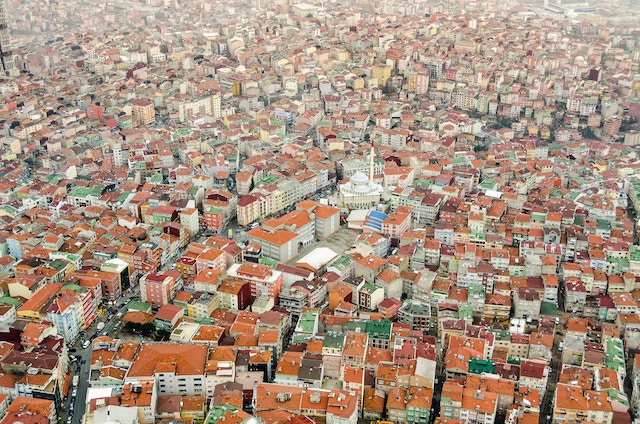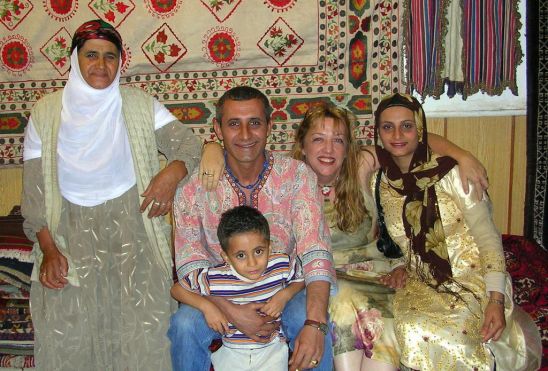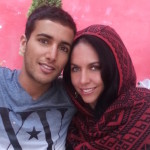In Defense of Turkish Men: A Love Story

A Chance Encounter in Turkey
The man in the well-cut black suit stood watching me as I struggled to carry my overweight duffel bag across the cobbles of the narrow shopping street. “Must be another carpet seller,” I sighed to myself; no way around him without reversing course. After three weeks of solo travel enjoying Western Turkey – that day a hot 3-hour bus ride from Pamukkale to the small Aegean town of Selcuk – I was tired and talked out.
A single foreign female of any age will invite attention from men, women and children. Depending on where I was, this attention was mostly benign, but exhausting. The Turkish people I’d met plus those I’d worked with on several previous business trips were genuinely hospitable, but too curious for my big-city American sensibilities. I just wanted to see the sites anonymously and then move on. But in Turkey, there is no such thing as being unobserved.
When Turks meet each other, the first question asked is “Where is your hometown?” This bit of knowledge imparts valuable social information, much like in the US, when we ask, “What do you do for a living?” Though Turks haven’t been nomads for centuries, it’s common to have lived in several parts of the country. Turks in tourism ask visitors “Where are you from?” for the same reason. I wrongly presumed they were trying to call me out as foreign, when it was already likely I was.
In Turkey, there is no such thing as being unobserved.
“Can I help you find a hotel?” the man in black said politely in perfect English, not asking where I came from.
“Know where I’m going – no thanks,” I replied, jerking my bag away from his outstretched arm as I mumbled the hotel name, to prove I wasn’t bluffing.
“But that’s in the other direction,” he responded with a slight smile. “And it’s not a very nice place.” Good ploy to get me to stay at his cousin’s hotel or have a look in his carpet shop, I thought. I knew by now to avoid these touts, since I’d been warned they were only after my credit card, my body, perhaps even a Green Card. That’s what every foreign women visiting Turkey is told to expect, aren’t we?
I’m experienced enough to know that life is not well lived by being tentative or fearful. I’ve developed a good instinct for self-preservation, having traveled solo to about 40 countries. Dress modestly, be aware of your surroundings, walk with purpose, don’t smile at everyone, seek local women if you need help. If I’d listened to the warnings that Turkey is dangerous and ignored my finely-tuned intuition, my life would not have taken the amazing turn it did.
A Turkish Love Story
For though I managed to elude the carpet seller that day, a casual conversation with him the next led to a stroll through the ruins of a 6th C basilica, dinner under a nomad tent during a thunderstorm, time spent together in Istanbul, and several more trips back to Turkey. He turned out to be genuinely good guy who had lived in three countries, including a decade in Istanbul. Eventually I relocated to Selcuk in 1999; we pooled our resources to open a vintage textile shop, and later a waterpipe cafe. A chance encounter on the street led to the life I was meant to be living. I’d fallen in love with the whole culture as much as with this man.
My friends and I are frequently asked by casual acquaintances how we deal with our husbands’ presumed infidelities, as if it’s a given that all Turkish men cheat.
A fairytale that rarely happens? Of the dozens of marriages between foreign women and Turkish men I’ve known, about half turn out well, much like other places in the world. But being married to a Turk has a stigma I wonder if other nationalities experience: my friends and I are frequently asked by casual acquaintances how we deal with our husbands’ presumed infidelities, as if it’s a given that all Turkish men cheat.
Why Turkish Men Have a Bad Reputation
While it’s true there are a significant number of Turkish men who flock to touristic locations for the sole purpose of playing gigolo or scoring a foreign passport, to cast aspersions on the entire male population is wrong. For a moment, consider life from the perspective of these men. I don’t agree with their thinking, but it may help to explain it. They could stay in their small towns to learn a trade; they could study to be accepted to university. Or they could work in tourism in the hope of meeting women from around the world, like the ones they’ve seen in countless Hollywood movies. After all, they think, it’s well known that Western women have loose standards and are looking for a holiday romance…why not with them? It’s far more enticing than staying in the village to deal with family customs around meeting Turkish girls.
Big-city Turks are different than the boys along the beaches. Sultanahmet salesmen have to be clever and quick, like sharks, always moving forward. Many of them are formally educated and speak 8 to 10 languages fluently. Yes, there are still the guys who call out “Hey, lady” in the street, clueless that a Western woman will be repelled. Completely ignore them as any Turkish woman would; they’ll move on to a traveler who reacts. We visitors are their daily sideshow, entertainment to pass the time and perhaps part with some cash. These men live with constant rejection, so no guilt for breezing right on by. Learn to say “ayip” (Aye-YIP) loudly just in case. But anyone interested in human nature could earn a street degree in anthropology by watching life within carpet shops.
But few Turkish women work in tourism because it can be annoying to deal with the men – Turkish or foreign.
In Selcuk, I was frequently asked “Where are all the women?” More than half the doctors, lawyers and accountants in this country are women. They work at every job, keeping busy as women must, with little time to wile away in teahouses. But few Turkish women work in tourism because it can be annoying to deal with the men – Turkish or foreign.
Showing People the Real Turkey
After a decade in tourism myself, I see their point. We’ve recently moved from Selcuk to Istanbul’s Old City to open a handcrafts workshop, a gathering place to support local unsung artisans: the women who grew up weaving, knitting, crocheting and making functional things of beauty for their families. Istanbul is a magical, challenging city with a diverse population of women. Some of these women are reviving timeless Turkish traditions as a hobby or a career. There are other women with fewer opportunities here from rural Turkey who’d like to earn money within a safe community of women. A village within a megacity, our workshop will give traveling women a chance to get to know Turkish women through classes we’ll offer. Hands engaged to learn new skills and teach traditional ones, spinning yarns, clacking needles and drinking tea together, we’ll share the common language of craft with stories from our lives and about our cultures.
Finding my place in another culture and a voice in my husband’s huge tribe was not for the faint of heart; it’s a journey that continues.
Traveling though a country is quite different than living there: it’s not the sites you must see, but the people you must connect with. Was I just lucky, to have happily married a Turkish carpet seller, a man as enchanted with textiles as I am, one who knows better than to hassle women on the street? I’d say we make our luck by action, not apprehension. Finding my place in another culture and a voice in my husband’s huge tribe was not for the faint of heart; it’s a journey that continues. In this ancient, indefinable country in which no one goes unobserved, I’ve learned to take chances. While I won’t defend all of them, sometimes it’s safe to talk to Turkish men.

California native Catherine Salter Bayar designs and writes from her new home in a very old city…visit her blog Tales from Turkey (www.bazaarbayar.blogspot.com) and expat+HAREM (www.expatharem.com), the global niche, where she is a serial guest blogger.
In Defense of Turkish Men: A Love Story









I want very much to write my story about my the way my turkish man and i met , fell in love, and will forever stay connected .
With age barrier and all my handsome turkish man will be a part of my life till i die .
I would actually like to
Write a fairytale love story that i can have published .
My first and last man was a turkish asylee who is from istanbul.
Although we met casually, in a house where i rent out rooms , is where i met a man who was in very strong conquest to convince me to have a relationship because he needed someone to protect him and take care of him .
This man was the loveliest , gentlest ,most amazing love of my life .
I loved this article, I recently was approached by a much younger very persistent Turkish man on a dating site.
At first I thought it was a scam because of the language, he persisted that even though their is an age barrier I should meet him.
I will say after meeting him, I would have dated a Turkish man a long time ago, he is a delight!
I sure missed the boat on this one, if only I could go back in time!
I interestingly read all you have written in order to understand foreigner perspective until I see a traditional Kurdish women in the picture you are in. I don’t get when people try to explain Turkish man by living so close to a Kurdish family. I am sorry to confirm whoever makes the comment about Turkish man can be right in some points whereas I as Kurdish youth can not be that much aggressive towards foreign woman. Thus, it is time to distinguish cultures.
Well written piece Catherine, personal and instructive at the same time. We all have these cultural overlays (some accurate, others not so much) that we bring to our interactions. It takes time and effort to dig deeper. Your story could be played out in cultures all across the globe.